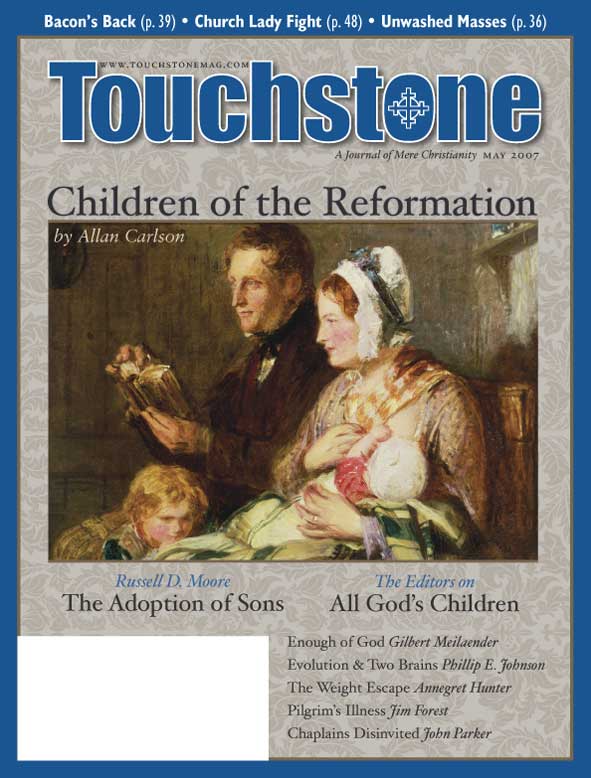All God’s Children
Families Need More Than Shoes on the Road to Heaven
Not so long ago, many families had four or five or even six or seven children. Now, to have six (as two of our editors do) makes people’s jaws drop, and to have even four (as three of us do) will elicit rude comments.
Several years ago, during a dinner at a Christian college, a woman at our table asked one of our wives how many children she had. Upon hearing the answer, the woman interrupted the conversations of her female companions with, “Hey! You all gotta hear this! She has six children!”
They were all married, all outspokenly devout Christian women who believed in the inerrant truth of “Be fruitful and multiply” and “Blessed is the man whose quiver is full of them [children].” And yet, as the conversation soon revealed, they could not imagine having more than two children—or possibly three.
Growing Decline
They represent, as observation and research both show, the dominant position among Western Christians. The families of church-going Christians have about the same number of children as families in the general population. Almost all of them believe that a couple can choose to remain childless, because bearing children is not essential to marriage, but a “lifestyle option.” At the extreme, some promote deliberate childlessness as “good stewardship.”
In Europe the birthrate is well below the replacement level of 2.1. Germany’s fertility rate is about 1.4, Spain’s and Italy’s about 1.3, for example, and these would be even lower but for the high birthrate among Muslim immigrants. Poland’s birthrate is below 1.3 and Russia’s is reportedly as low or lower. France’s and Ireland’s rates are the highest, but still below replacement level.
Their national economies are now threatened by having fewer (younger) workers supporting an aging population, and their cultures are threatened by the increasing percentage of their populations who do not share their history, religion, or values. Some government officials and intellectual leaders, though by no means all, are worried, but they are also at a loss as to how to reverse the decline.
They should be worried, for its reversal—a return to larger families—would require the great majority of citizens to adopt a life that they’ve never experienced: the sacrificial economy of large families. It would also require them to adopt an ideology or imagination that they have rarely, if ever, heard articulated, even in the churches: that of an economically sacrificial and risky generosity to the future, expressed and fulfilled through procreation.
Neither change is one that citizens of affluent Western societies are likely to make. Infertility will hurt their societies in the long run, but as John Maynard Keynes famously said, when challenged about the long-term results of his economic policies, “In the long run we’re all dead.” Fallen man needs some more compelling reason to sacrifice himself in the present than the likely suffering of some future generation. He worries far more about his children (and himself) than about his great-grandchildren.
He imagines that if he has a large family, his own children will suffer. (Americans worry especially about paying for college.) The idea of having more than one or two or perhaps three children intimidates almost any couple, who think they cannot possibly afford the extra child, because the “normal” life—the life that reaches the minimum level of affluence and security they think necessary (and have been told is necessary by their peers and by advertisers)—costs so much.
James M. Kushiner is the Director of Publications for The Fellowship of St. James and the former Executive Editor of Touchstone.
David Mills has been editor of Touchstone and executive editor of First Things. He edits the opinion page of the Pittsburgh Post-Gazette.
subscription options
Order
Print/Online Subscription

Get six issues (one year) of Touchstone PLUS full online access including pdf downloads for only $39.95. That's only $3.34 per month!
Order
Online Only
Subscription

Get a one-year full-access subscription to the Touchstone online archives for only $19.95. That's only $1.66 per month!
bulk subscriptions
Order Touchstone subscriptions in bulk and save $10 per sub! Each subscription includes 6 issues of Touchstone plus full online access to touchstonemag.com—including archives, videos, and pdf downloads of recent issues for only $29.95 each! Great for churches or study groups.
Transactions will be processed on a secure server.
more from the online archives

33.2—March/April 2020
Christian Pro-Family Governments?
Old & New Lessons from Europe by Allan C. Carlson

27.6—Nov/Dec 2014
Tales of Forbidden Stereotypes
Real-Life Men & Women & the Tragic Loss of Human Comedy by Anthony Esolen
calling all readers
Please Donate
"There are magazines worth reading but few worth saving . . . Touchstone is just such a magazine."
—Alice von Hildebrand
"Here we do not concede one square millimeter of territory to falsehood, folly, contemporary sentimentality, or fashion. We speak the truth, and let God be our judge. . . . Touchstone is the one committedly Christian conservative journal."
—Anthony Esolen, Touchstone senior editor







